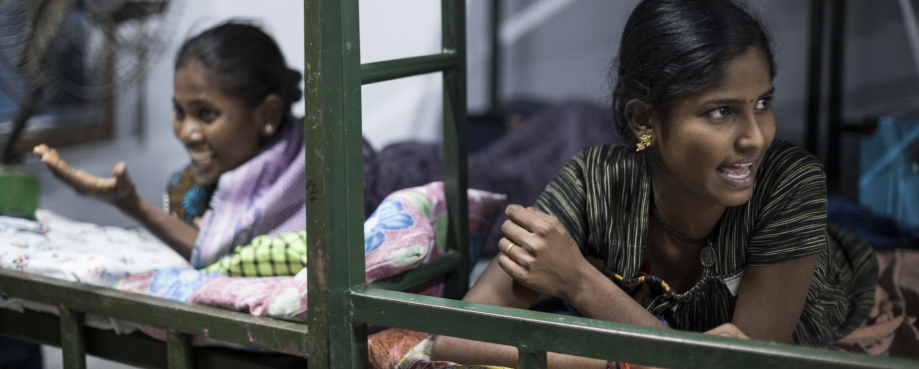
The year 2019-2020 has been a year of two halves, each very different to the other.
The first part of the year was devoted to analysing and reviewing how far we had achieved our strategic goals for 2015-2020, consulting widely and developing a compelling new strategy to take the organisation forward. A number of aspects came through strongly in these consultations, which taken together related to the impact of transitions and shocks to supply chains. Little did we know how prophetic that would be.
This strategy has been reviewed and adapted in the light of Covid-19, but its essential focus and themes are even more relevant in a time of such uncertainty and transition. It continues to inform our work and focus during the Pandemic, albeit within an adapted and adjusted structure and approach which prioritises supporting members through this difficult period and beyond, and strengthening ETI’s resilience and preparedness for the years ahead.
In relation to our rapid responses to emerging issues during the Pandemic, we continued our engagement throughout the year via one-to-one contacts and support, collective action on key issues, training, advocacy, and on-the-ground projects. We also drew from the strength of ETI - its membership, to share good practice, drive collective action on key issues and use the network our membership brings to reach out to workers along supply chains, including in new areas such as seafarers.
These are challenging times, but ETI will continue to prioritise supporting members and facilitating a united, multi-stakeholder approach and to ensuring resilience and sustainability in global supply chains, by placing workers at the centre of everything we do.
Peter McAllister, Executive Director
In addition to the day-to-day engagement, specific projects have included: supporting women garment workers via our factory-based social dialogue work in Bangladesh and continuing support for workers in the cotton mills in southern India, training for Chinese managers in Myanmar and, with support from the UK FCDO, provision of advice to buyers on unauthorized subcontracting in China. We also launched new projects on migrant labour abuses and human rights due diligence in the manufacturing sector in Malaysia and concluded a major piece of work on child labour in the Pakistan surgical instruments supply chain.
There have also been some notable policy and advocacy impacts in relation to modern slavery, including a high-level conference on modern slavery in public procurement, the completion and publication of ETI’s own Modern Slavery Statement, the adoption of our Modern Slavery Statement Framework, as a tool by the UK Home Office, and our work with the Home Office and other government departments to develop and improve the implementation of Modern Slavery Act Section 54.
ETI has also been active, and seen impacts, in international advocacy in relation to the Thai seafood sector, providing a unifying influence to drive effective change for workers by building understanding and collaboration between actors, informing workers of their Rights, and providing both channels to give voice to their concerns, and an enabling environment for freedom of association and worker empowerment.
Other key highlights include engagement with the Indian government on new apprenticeship legislation, a good labour practice guide for horticulture exports from Colombia, Mexico and Peru and the establishment of a local multi-stakeholder forum to tackle labour rights abuses in the Italian tomato supply chain. We also continued to engage local stakeholders around the garment industry in Leicester UK, in order to address the continuing problems around low pay and exploitative conditions.
We published Base Code guidance on caste discrimination, a handbook for worker representation, a briefing on State Imposed Forced Labour and a briefing on the ILO Convention 190 on violence and harassment in the workplace, which we promoted to members via a major learning event held on International Women’s Day and involving contributions from both the ILO and global unions.
In autumn 2018 the DfID (now FCDO) RATE team announced an opportunity to extend their partnership with ETI for an additional year. This supported ETI in its transition from one strategic period to the next while allowing us to finalise deliverables within the Freedom of Association and Modern Slavery workstreams. ETI has successfully delivered against all 5 pillars the strategy was designed around; leading on the application of the UN Guiding Principles on Human Rights in the area of workers’ rights; ensuring workers are properly represented; supporting an emerging international network of ethical trade platforms; increasing business transparency and accountability; influencing policy and practice; and investing in the operational structures to achieve all these.
Highlights from the period include our Human Rights Due Diligence Framework, the establishment of independent ethical trade platforms in North India, South India and Bangladesh, and multi-stakeholder platforms in South East Asia, the UK, South Africa, Turkey and Italy; the development of our accountability framework for corporate members, Perspective, and a Transparency Roadmap, due to be implemented over the coming year.
Looking back from time to time is useful, but we are fully focused on the realities we face and the longer-term needs. We recognise that these are challenging times, but ETI will continue to prioritise supporting members and facilitating a united, multi-stakeholder approach and to ensuring resilience and sustainability in global supply chains, by placing workers at the centre of everything we do.
